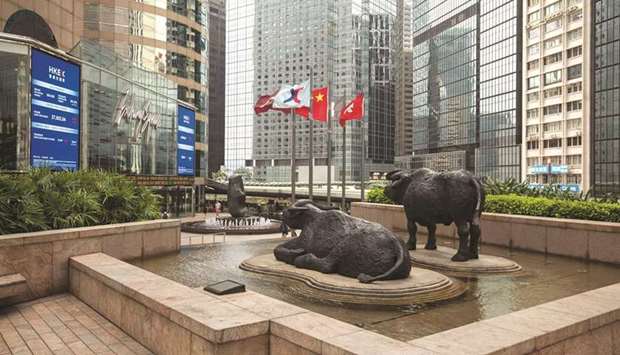Asian equity and oil traders were sent running on Tuesday after the head of Moderna warned current coronavirus vaccines might be less effective at fending off the Omicron variant, fuelling fears that countries could be forced back into economically painful lockdowns.
Stocks had mostly been edging up after a two-day sell-off that followed news Friday of the new variant, which some observers said was overdone as billions of people have been inoculated.
But Stephane Bancel’s comments in an interview with the Financial Times sent shivers through markets again, as he said the high amount of mutations on Omicron and its swift spread in South Africa indicated the present jabs would need to be tweaked.
“There is no world, I think, where (the effectiveness) is the same level...we had with Delta,” he told the newspaper.
Tokyo’s Nikkei, which had been in positive territory through much of the day, ended more than 1% down, and Hong Kong extended losses.
Seoul sank more than 2% and Singapore dropped more than 1%. Jakarta was also down and futures in New York were sharply lower.
Sydney, Wellington and Taipei closed higher before the interview was published. The selling also spread to oil markets where both main contracts plunged more than 3%, after slowly recovering from Friday’s collapse of more than 10% as demand fears came flooding back.
Tourism-linked firms were among the worst hit with Cathay Pacific losing more than 4% in Hong Kong — having already been impacted by new restrictions on travel to the city — and Singapore Airlines off more than 1%. “Information on the Omicron variant is sketchy, how drastic its symptoms will be and how easily it can spread is also unknown, as is the effectiveness of current vaccines,” said Kelvin Wong at CMC Markets.
“I expect more downside risk for the next couple of weeks unless there’s more clarity on the Omicron strain.”
Bancel’s remarks come after major firms said they were already working on a jab specific to the new strain.
Pfizer chief Albert Bourla said testing could show existing shots “protect less”, which would mean “that we need to create a new vaccine” but added that he did not think the “result will be the vaccines don’t protect”.
There remains a lot of uncertainty among traders, and experts said it would take weeks before the full effects of the variant are known.
The World Health Organisation warned it poses a “very high” risk globally. Investors have suffered a tough few months as they navigate the impact of surging inflation and the prospect of central banks withdrawing the ultra-loose monetary policies put in place at the start of the pandemic.
US Federal Reserve boss Jerome Powell warned the latest emergency posed “downside risks to employment and economic activity, and increased uncertainty for inflation”.
In prepared comments ahead of an appearance in front of the Senate Banking Committee later Tuesday, he also said the virus could “intensify supply-chain disruptions” that have been a major cause of the inflation spike this year.
Oil traders kept tabs on Opec and other key producers, who are due to decide on whether to press on with their plan to lift output each month in light of the new travel restrictions and the threat of Omicron.
The group had already been contemplating a pause after the United States and several other countries including China and Japan released some crude from their reserves to temper a price surge.
Carsten Fritsch of Commerzbank said “there is much to suggest that Opec+ will not initially step up its oil production any further” in an effort to maintain current prices at around $70 a barrel.
In Tokyo, the Nikkei 225 closed down 1.6% to 27,821.76 points; Hong Kong — Hang Seng Index ended down 1.9% to 23,393.74 points and Shanghai — Composite ended flat at 3,563.89 points yesterday.

Sculptures stand outside the Hong Kong Stock Exchange. The Hang Seng Index closed down 1.9% to 23,393.74 points yesterday.
